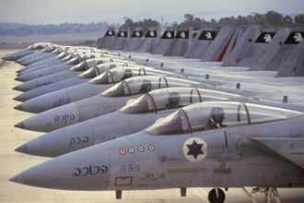 El diario The New york Times, que normalmente publica noticias y artículos que justifican la conducta de Israel, esta vez parece que ha dicho “¡Basta!” y expone las cosas como son. Larry Derfner, en su artículo “Israel’s Next War Is Always ‘Inevitable’” (‘La próxima guerra es inevitalble’) explica cómo en Israel se ha desarrollado una mentalidad totalmente agresiva, que busca debilitar y desestabilizar a sus vecinos.
El diario The New york Times, que normalmente publica noticias y artículos que justifican la conducta de Israel, esta vez parece que ha dicho “¡Basta!” y expone las cosas como son. Larry Derfner, en su artículo “Israel’s Next War Is Always ‘Inevitable’” (‘La próxima guerra es inevitalble’) explica cómo en Israel se ha desarrollado una mentalidad totalmente agresiva, que busca debilitar y desestabilizar a sus vecinos.
Reproducimos el artículo en inglés y ofrecemos la traducción de párrafos importantes.
Modiin, Israel. En este país, la gente ha aprendido a aceptar que tras una guerra viene otra, cada dos o tres años. “Un conflicto Inevitable en Gaza”, dice un titular en el diario Yediot Ahronot a principios de este mes. “Con el Líbano que ya no oculta la vigencia de Hezbollah, la próxima guerra debe golpear a los civiles donde más les duele, declara el ministro israelí”, informó Haaretz pocos días después.
Sin embargo, lo que los israelíes apenas toman en cuenta, y casi no hay voces influyentes en Occidente que lo insinúen públicamente, es que Israel —no Hezbolláh en el Líbano, ni Hamas en Gaza, ni el gobierno del presidente Bashar al-Assad en Siria— está provocando la próxima guerra. Aunque parezca contrario a la intuición de las mentes israelíes y occidentales, Israel —no los radicales islamistas o los brutales enemigos sirios— es el agresor en estas guerras de frontera.
-----0-----
Aquí se considera perfectamente legítimo —en verdad, necesario— atacar con bombarderos y drones para impedir que Hezbolláh consiga armas avanzadas. Según la opinión israelí predominante, Hezbollah está empeñado en la destrucción de Israel y actuará en cumplimiento de sus deseos tan pronto como se sienta lo bastante fuerte, así que lo único por hacer es evitar que se fortalezca. Y si en una de estas ocasiones Siria o Hezbollah contraataca y mata a algunos israelíes y estalla otra guerra… bueno, de todos modos la próxima guerra es inevitable. Nada que hacer mientras tanto sino seguir bombardeando.
Israel ataca continuamente a Siria, a veces matando sirios y miembros de Hezbolláh, incluso cuando estos no atacan a Israel. No se atreven a bombardear depósitos israelíes de armas o atacar a connotados militares israelíes; Israel es muy fuerte para que lo intenten*.
-----0-----
Desde la guerra de 2006 contra Hezbollah en el Líbano, Israel ha librado tres guerras contra Hamas que asolaron Gaza. Avigdor Lieberman, ahora ministro de Defensa, ha dicho que la próxima es “inevitable”. Y ahora los ataques contra Siria y Hezbolá han pasado de uno cada pocos meses a cuatro en menos de una semana. ¿Cuánto tiempo pasará antes de que Israel desencadene su próxima “guerra en defensa propia”?
____________
* Parece que ya se colmó la paciencia de Hezbolláh, que ahora ha advertido que si lo atacan, responderá bombardeando plantas químicas y nucleares de Israel.
Israel’s Next War Is Always ‘Inevitable’
By Larry Derfner*

MODIIN, Israel — In this country, people have learned to accept that one war follows another, every two or three years. “An Inevitable Conflict in Gaza,” ran a headline in the daily newspaper Yediot Ahronot earlier this month. “With Lebanon no longer hiding Hezbollah’s role, next war must hit civilians where it hurts, Israeli minister says,” Haaretz reported a few days later.
What hardly any Israelis will consider, though, and virtually no influential voices in the West will publicly suggest, is that Israel — not Hezbollah in Lebanon, nor Hamas in Gaza, nor the government of President Bashar al-Assad in Syria — is provoking the next war. Counterintuitive though it may be to Israeli and most Western minds, Israel, not its militant Islamist or brutal Syrian enemies, is the aggressor in these border wars.
On March 17, Israeli military jets did what they’ve been doing every few months since the Syrian civil war started in 2011 — they bombed Syrian weaponry believed destined for Hezbollah, Syria’s ally and Israel’s enemy in southern Lebanon. But this time, instead of letting the attack pass without a response as it usually does, the Syrian Army fired antiaircraft missiles at the Israeli jets.
By the time the exchange was over, air raid sirens had woken people in Israel. Afterward, Prime Minister Benjamin Netanyahuadmitted publicly what Israel was doing. “Our policy is very consistent,” he said. “When we identify attempts to transfer advanced weapons to Hezbollah, and we have the intelligence and the operational capability, we act to prevent that. That is what was and that is what will be.”
According to Syrian reports, he was as good as his word. In the following days an Israeli drone killed a pro-government militiaman in Syria and Israeli jets struck targets on the Syrian-Lebanese border, then hit Syrian Army posts near Damascus.
Around here it is considered perfectly legitimate, indeed necessary, to send bomber jets and drones to stop Hezbollah from getting advanced weapons. According to mainstream Israeli thinking, Hezbollah, being pledged to Israel’s destruction, will act on its desire as soon as it gets strong enough, so the only thing to do is prevent it from getting strong enough. And if one of these times Syria or Hezbollah hits back and kills some Israelis and another war breaks out — well, the next war’s inevitable anyway. Nothing to do in the meantime but keep bombing.
Israel is continually attacking Syria, at times killing Syrians and Hezbollah members even though they’re not attacking Israel. They don’t dare bomb Israeli weapons depots or go after Israeli military figures; Israel is far too strong for that.
Hezbollah and Syria are well and truly deterred, and if Israel were to simply let them be, they would have to be crazy to strike first. (Hezbollah tried that in 2006, killing two Israeli soldiers in a cross-border raid, and in the war that followed Israel taught Hezbollah and all of Lebanon a very harsh, lasting lesson.) But if Israel keeps rubbing their noses in their weakness — as Mr. Netanyahu is now doing — national honor at some point will compel them to hit back with force. The “inevitable” next war will begin.
That very scenario was probably averted this month only because the Syrian antiaircraft missiles missed the Israeli jets.
With Hamas in Gaza, the situation is somewhat different. There, no deterrence will work for long because unlike with Lebanon — where Israel ended its occupation in 2000 — Israel to this day controls Gaza militarily from without, rules its sister territory, the West Bank, from within, and keeps several thousand Palestinians from Gaza and the West Bank in Israeli prisons.
Until all that ends, there is no deterring Hamas or the more radical Islamic groups in Gaza over the long term — and probably not in the West Bank either. As long as the Palestinians live under hostile Israeli rule, they will always have a reason to attack, and sooner or later they will. While the Palestinian government in the West Bank has become Israel’s grudging collaborator, Hamas and the more radical groups in Gaza are pledged to fight.
Lately, militant groups in Gaza other than Hamas have been firing their rockets in Israel’s direction, typically hitting nothing but open space. In return, Israel has been blasting away at Hamas military targets. Hamas has been holding its fire, but as the military affairs commentator Alex Fishman wrote in Yediot Aharonot, that calm “may be broken as soon as Israel attacks and Hamas feels that it can no longer take the humiliation, or if an Israeli strike leaves too many casualties.”
Since its 2006 war with Hezbollah in Lebanon, Israel has fought three wars against Hamas that devastated Gaza. Avigdor Lieberman, now the defense minister, has said that the next one is “inevitable.” And now the attacks on Syria and Hezbollah have gone from one every few months to four in less than a week. How long before Israel wages its next “war of self-defense”?
__________
* Larry Derfner, a journalist, is the author of the forthcoming memoir “No Country for Jewish Liberals.”
The New York Times, 28-03-2017
https://www.nytimes.com/2017/03/28/opinion/israels-next-war-is-always-inevitable.html?_r=0
Artículos relacionados
Israel dice que atacará defensa aérea siria pese a presencia rusa
“Siria fue capaz de detectar los movimientos de los aviones israelíes y responder”
Ejército sirio derriba con misiles antiaéreos un caza israelí
Israel: Asesor de Netanyahu defiende al terrorismo islámico
Israel aumenta el apoyo médico a terroristas heridos en Siria
Israel: Ministro de Guerra reconoce apoyo de su gobierno a terroristas en Siria
Combatientes terroristas reciben auxilio médico de Israel
Los terroristas felicitan a Israel por reciente ataque a Siria
“Siria fue capaz de detectar los movimientos de los aviones israelíes y responder”
Ejército sirio derriba con misiles antiaéreos un caza israelí
EE. UU. teme que los misiles S-300 rusos derriben sus cazas en Siria
“Al-Asad advierte a Israel con derribo de sus aviones en Siria”
Harto de abusiva usurpación territorial israelí: Assad luchará por recuperar meseta del Golán
Altos del Golán: Israel desde 1967 se apodera de territorio y agua de Siria
Inteligencia israelí teme liberación de Golán por Irán y Hezbolá
